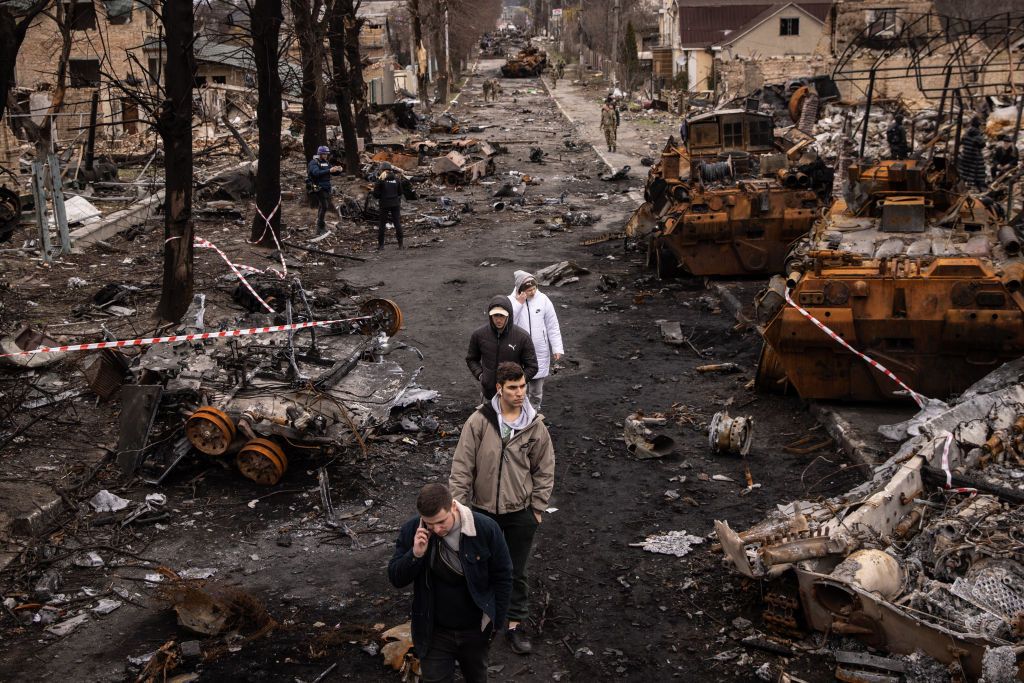Opinion: Trading territories means trading people
To freeze the war by conceding territory is to freeze the suffering of those living under Russian occupation.

A child cries as they hug their mother prior to the departure of an evacuation train from Pokrovsk, Ukraine, on Aug. 2, 2024, amid Russia's full-scale war against Ukraine. (Ed Ram/For The Washington Post via Getty Images)

Danylo Mokryk
Reporter at the Kyiv Independent's War Crimes Investigations Unit
The following opinion piece accompanies the Kyiv Independent's War Crimes Investigations Unit's newly released documentary, "Shadows Across the River." Watch the documentary by clicking here.
“Let Russia retain control over occupied Ukrainian territories to finally freeze this war!” This refrain, repeated in media and political discourse worldwide, has become a popular "peace plan" for Russia’s war against Ukraine. Yet, one crucial question is rarely asked: What would this formula mean for Ukrainians living under Russian occupation?
Perhaps this question is overlooked because some assume life in these occupied regions has normalized, that people have adapted, and that everything is fine. This impression is precisely what Russian propaganda works to promote while barring independent observers, journalists, and law enforcement from accessing these territories. The truth remains obscured, buried under Russian state media’s portrayal of control and calm.
However, glimpses of the truth sometimes slip through – even from Russian media and officials. Dmitry Medvedev, the deputy chairman of Russia’s Security Council, let slip the grim reality in an interview in February. When asked what should be done with Ukrainians waiting for their land’s liberation by the Ukrainian army, he said:
“If these people are harming Russia, they must be exposed and punished. We should send them to Siberia for re-education.”
These words not only echo the repression of the Soviet era but openly admit to the systematic terror Russia now imposes on Ukrainian territories under its control.
This terror is ongoing and pervasive, yet it remains difficult to document – not only because access is restricted but because fear silences those who manage to escape. Even those who flee occupation (a dwindling number) are often afraid to speak out, fearing for the safety of relatives and friends still trapped under Russian rule. Many survivors say, “We’ll tell everything when the area is liberated.”
"This terror is ongoing and pervasive, yet it remains difficult to document – not only because access is restricted but because fear silences those who manage to escape."
This doesn’t mean that information about Russian crimes never gets through. Reports of arrests, abductions, torture, and murders occasionally reach journalists and law enforcement. From time to time, a new atrocity comes to light – with names, dates, and brief accounts of what happened. But these fragments of information are sporadic and incomplete.
We’ve seen this before. In March 2022, northern Ukraine was occupied, and scattered reports of killings and other crimes trickled out from places like Bucha and Irpin. Only after the Russian forces retreated did the full scale of the systematic terror become shockingly clear.
For now, we can only catch glimpses through the iron curtain Russia has drawn over these territories. But persistence pays off. The Kyiv Independent’s War Crimes Investigations Unit recently released a documentary, “Shadows Across the River,” detailing the terror in Hornostaivka, a town on the Russian-controlled bank of the Dnipro River in Ukraine’s Kherson Oblast.

Our investigation uncovered widespread abductions, torture, and murders orchestrated by the Russian military commandant’s office in the town and nearby villages. We revealed a torture chamber in the former Ukrainian police station on Torhova Street, where likely hundreds of people were detained, many brought from towns miles away. We identified both victims and perpetrators.
Crucially, the atrocities in Hornostaivka didn’t end in 2022. The terror continued into 2023 and likely still does. Anyone can be a target: former Ukrainian soldiers, business owners whose properties Russian forces covet, or even someone greeting others in a shop with "Glory to Ukraine."
Our documentary focuses on Hornostaivka, but similar horrors are unfolding in other towns across Russian-controlled parts of Kherson Oblast and beyond.
An uninformed reader might wonder: if conditions are so terrifying, why don’t more people flee? Many have tried, but escape is fraught with danger.
First, Russian forces scrutinize anyone attempting to leave, and signs of pro-Ukrainian sentiment, far from facilitating departure, often lead to detention or torture, as we show in our film. Second, the elderly and the sick may be unable to make the journey, leaving their caregivers behind as well. Others choose to stay to protect their homes from Russian looters.
For many Ukrainians, occupation has become a trap. Their only hope lies in liberation.
Liberation is also the only path to truth and justice. Only then can we fully uncover the scale of terror and document it properly, just as we did after the liberation of Bucha in 2022 and Izium six months later. Once free, crime scenes and evidence will surface, survivors will speak, and the land itself will testify.
"Liberation is also the only path to truth and justice. Only then can we fully uncover the scale of terror and document it properly..."
In one of our earlier documentaries examining the genocidal nature of Russia’s war against Ukraine, Johns Hopkins University scholar Eugene Finkel predicted:
“We know about Izium, Bucha, Borodianka, Irpin, and Kherson because those places were liberated. I’m absolutely convinced that when the Ukrainian army reaches places like Melitopol, we will see mass graves and evidence of mass murder. We just don’t have access to those places yet.”
This access will come only when Ukrainian territories are freed from Russian control. Any so-called "peace plan" that leaves them under Russia’s grip will only entrench the terror, conceal it beneath propaganda, and render justice impossible.
This is not an abstract issue; it’s about the lives of real people. To leave them under Russian control is to condemn them to countless tragedies, burying them under the guise of "peace."
Editor’s Note: The opinions expressed in the op-ed section are those of the authors and do not purport to reflect the views of the Kyiv Independent.













